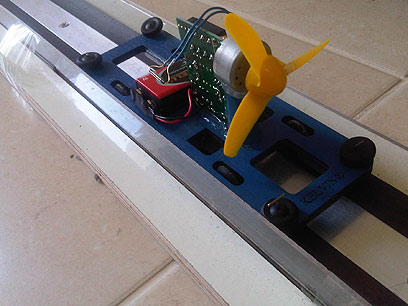Technion Autonomous Systems Program (TASP)
Technion student ingenuity wins 1st prize for Maglev car.
“Studying at the Technion has made me realize I can learn and create almost anything.”
 |
| Alert to future need: graduate student in civil engineering Erez Horev. |
Cars that use magnets to hover through the air could sound like science fiction, or the fantasy of children. But since the success of high-speed Maglev (Magnetic levitaton) trains in Japan, there is reason to dream. Having worked in Israel’s transport system, Technion student Erez Horev is determined to explore the science that could make Maglev transport part of Israel’s future – dramatically saving energy and reducing environmental damage.
Although he is a graduate student in civil engineering, Erez Horev heard of the competition at the Technion Autonomous Systems Program and seized the moment. For months in his spare time he had been working on his Maglev car, and although his supervisor saw it as “too futuristic” for a full-time research project, Horev (like his name-sake former Technion President and global leader in engineering Amos Horev), he doesn’t give up.
The first prize, won together with another project in which a toolbox follows it’s owner around, won the attention of Israel’s national media. The idea first came to Horev when he was working on Israel’s new fast pay-road Highway 6, and later on the new light rail project in Haifa. The car operates normally but has six magnets attached to underside. When it enters the magnetic highway, the system is activated. “With this system, you could live in Italy and work n Germany and commute the whole distance in 50 minutes,” says Horev. “The car will go at 400 mph and the driver can go to sleep.”
In ordinary vehicles, 99% of the energy is used to overcome the friction between the wheels and the road. In the Maglev car, the friction is so minimal that it would lead to enormous savings in fuel. The system simulates a magnetic toll road for private vehicles. “Because of the high speeds that can reach them using this technology, the project could compete not only with existing toll roads, but even with domestic flights and trains,” says Horev.
 |
| Prize-winning Maglev car prototype “floats” above road surface at high speed. |
“At the Technion, studies are always multidisciplinary. Although I study civil engineering, we also delve into physics, mathematics, organic chemistry. Studying at the Technion has made me realize I can learn and create almost anything.”
One can’t help think about Technion graduate Shai Agassi who presently launching his exemplary electric car system and infrastructure in Israel through his global company Better Place. A man who dares to dream and has the practical penchant for problem-solving and determination to see a project through, Horev admits that Agassi is in himself a template for Technion students.
“Every day is a new day,” he smiles, “Today, there is little research in the field of maglev. It is seen as too futuristic. But I will go on implementing the idea in my space time. I want to address a huge demand for governments and companies to invest in research and development of new transportation methods and efficiency, since citizens are tired of spending more than two hours in endless traffic jams. This issue is close to my heart, and I’m going to go with it to the end.”
To enhance their research, the Technion established the Technion Autonomous Systems Program(TASP), the only one of its kind in Israel, and the scientific home for dozens of advanced researchers from many faculties.
